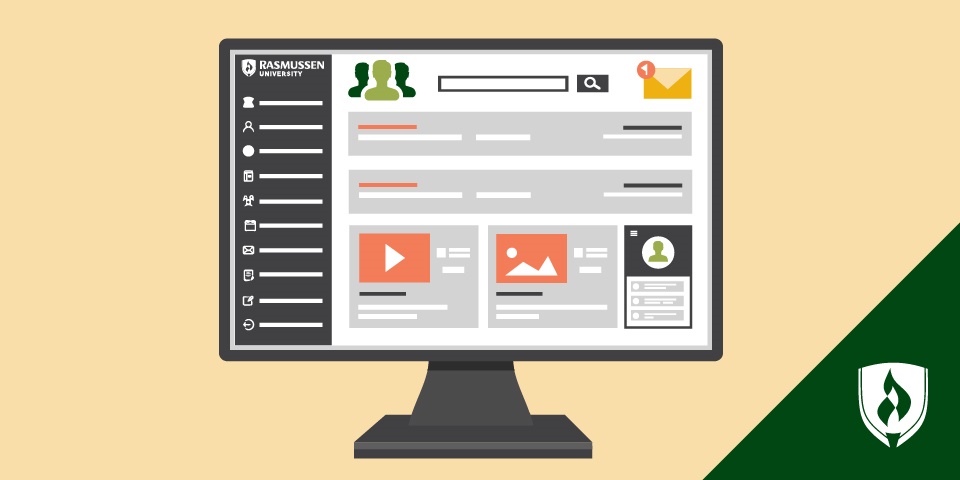
Online learning has become a key component of education. Nowadays, it’s fairly common for students enrolled in primarily campus-based learning to take courses that are partially or fully online. But as someone who has spent years refining what works best for you in a traditional classroom setting, it’s understandable if you’re a little apprehensive about making the switch to this format.
So how do you set yourself up for success in an online class format? We’ve asked students and educators to share the habits they created and steps they took to be successful in an online classroom.
6 Practices that can lead to online student success
Are you new to online education and looking to hit the ground running? Consider the following before getting started.
1. Create an effective work space
Your computer connects you to the world. Though this makes it possible to take an online class, it also makes it possible to blow through three hours looking up funny cat videos or browsing social media. How you choose to set up your virtual learning space will have a big effect on your ability to focus and maintain a routine around your online classwork.
“I think you can do more to better your experience outside your computer than within it,” says online educator Alex Beene. “I’d recommend finding one location—either a room in your house or apartment or even a quiet public location like a library or park with WiFi—to do all your online classwork throughout the semester.”
Take the time to assess where you’re planning to do your work and set yourself up for success. Remove potential distractions as best you can and create a space you can reliably hunker down in for serious focus.
“My students who have tried this say they end up getting so much more done because mentally when they seclude themselves in the same spot each week they can more easily take on the tasks a class requires.”
2. Have a backup plan
In a traditional classroom environment, forgetting your pen in English class isn’t great, but odds are good someone can help you out with a spare. Having your internet connection break down, a computer virus, or a pet who likes to chew on your laptop’s charger can be a much bigger setback during an online class. While technical support can help resolve a lot of this with enough time, it helps to have an emergency back-up plan for mishaps that happen during crunch time.
“Technical problems are sure to come up,” says Aaron Simmons, founder of Test Prep Genie. “Even if you get stuck not being able to be online, you still need to get the course work done.”
As you’re progressing through your courses, take steps that can help ease technical issues. If possible, download or save course materials so they can be accessed offline, have a physical copy of contact information for instructors and technical support, and consider who you could turn to for temporary computer and internet access in a pinch.
3. Make a conscious effort to ask questions and stay engaged
Sometimes it can feel like there is extra distance between you and your professor in an online class. But don’t let that become a barrier to your education. Make the effort to be an active and engaged student.
“Don’t just wing it and hope what you turn in is what your instructor expects,” says online educator Amanda Page. “Students might not feel connected enough to ask questions of their professors, but asking those questions can help build rapport. When in doubt, ask. Build that habit. Asking for clarification is a good skill to have in an online course and in life.”
Keeping the lines of communication open is a great habit. If you’re having trouble with understanding a concept based on the materials provided, your instructor can attempt to explain it in other terms that can help make it click. If you think your instructions for an assignment are a little ambiguous or hard to understand, seek out clarity. Doing this will help you in the short term and can help improve the class experience in the long term—feedback fuels change and adjustments.
4. Make a clear line between school time and social time
You may already be in the habit of setting aside specific time each week to work on an online class. Making sure those around you (roommates, family, friends) know when those times are, and when not to disturb you, can help keep your routine focused and consistent.
“Set aside both online study time and family time,” advises Dr. Linda K. Kimble, former school superintendent. “Your family needs to know when you are going to be focused on your studies and when you can focus your energy on them. Trying to do both at the same time will lead to frustration for your family members and for you. It will seem odd at first, but making appointments with your family to have focused time will pay off in productivity.”
This can be a big adjustment if you’re typically a do things at the spur of the moment type, but setting aside dedicated time on your weekly calendar for your work can be a big help. Block off chunks of time every day—if it turns out you have a light course workload for the day, the new free time you have can feel like a treat.
5. Plan ahead
This is a habit that’s closely tied to keeping social and school time separate. Time management will be your lifeline as an online student. Developing consistent time management strategies will allow you to stay up to date on classwork and avoid becoming overwhelmed with assignments.
“Time management strategies are the number one thing students need online,” says online educator Karen Southall Watts. Southall Watts suggests creating a master schedule, finding the best time of day for you to tackle difficult work and possibly applying a work / break method like the Pomodoro Technique for longer course work sessions. Additionally, she suggests assessing the upcoming workload as soon as possible so you’re not scrambling to complete what should have been done over the course of a week in a day.
“I advise all my students to access all the materials for a module as soon as they are available and quickly skim through everything,” Southall Watts says. “Then they can more effectively plan out how to divide up the work for the time allotted.”
6. Study your own habits
One of the best ways to create good study habits is to pay attention to what works best for you as a student. What works best for your classmate might not be the best advice for your unique educational needs. If you build awareness of how you work best, you can create those conditions for yourself in your online classwork.
“Each individual has different levels of self-control and unique habits,” says Caitlin Crosby, music student at the University of Kansas. “Observe what makes it hardest for you to focus by asking things like: is it helpful or harmful to have background music? Do I need to limit how many snack or water breaks I take? What aspects of my environment are stressful?”
Take stock of how things are going and don’t be afraid to tweak your approach—it might take a little experimentation with study and work habits to find an effective groove.
Interested in pursuing an online education?
Online learning offers an incredible opportunity to study despite physical limitations like distance or schedule conflicts. Though it may take an adjustment period, at the end of the day the same persistence and hard work that allows you to succeed in classroom based learning will help you succeed online.
Of course, not all online education experiences are created equally. If you’re interested in learning what makes for a standout online education, check out our article “Online by Design: 5 Things to Look for in a Great Online Education.”




